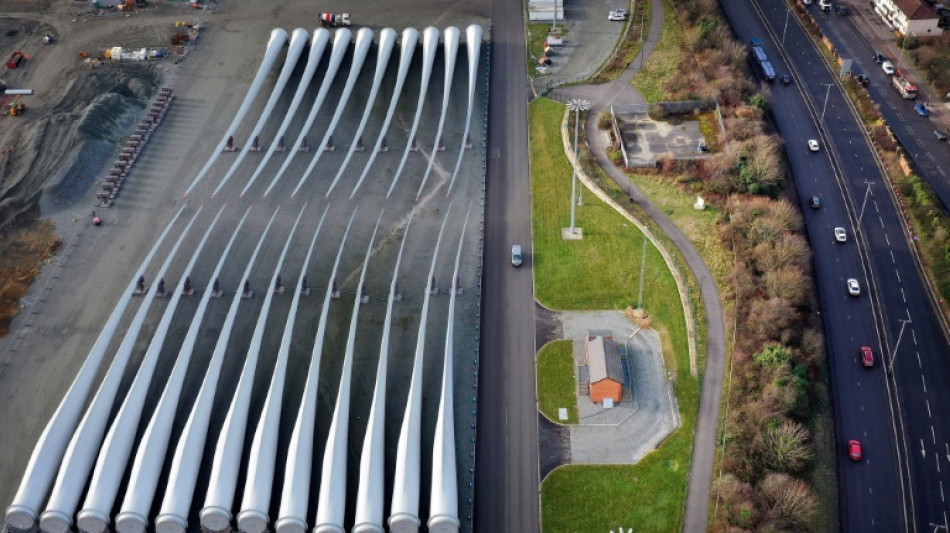
-
 SFWJ / Medcana Announces Strategic Expansion Into Australia With Acquisition of Cannabis Import and Distribution Licenses
SFWJ / Medcana Announces Strategic Expansion Into Australia With Acquisition of Cannabis Import and Distribution Licenses
-
Maresca confident he will survive Chelsea slump

-
 Mob beats to death man from persecuted Pakistan minority
Mob beats to death man from persecuted Pakistan minority
-
Lebanon says one killed in Israeli strike near Sidon

-
 Arsenal's Havertz could return for Champions League final
Arsenal's Havertz could return for Champions League final
-
US officials split on Ukraine truce prospects

-
 Client brain-dead after Paris cryotherapy session goes wrong
Client brain-dead after Paris cryotherapy session goes wrong
-
Flick demands answers from La Liga for 'joke' schedule

-
 'Maddest game' sums up Man Utd career for Maguire
'Maddest game' sums up Man Utd career for Maguire
-
Trial opens for students, journalists over Istanbul protests

-
 Gaza rescuers say Israeli strikes kill 24 after Hamas rejects truce proposal
Gaza rescuers say Israeli strikes kill 24 after Hamas rejects truce proposal
-
'Really stuck': Ukraine's EU accession drive stumbles

-
 'Not the time to discuss future', says Alonso amid Real Madrid links
'Not the time to discuss future', says Alonso amid Real Madrid links
-
74 killed in deadliest US attack on Yemen, Huthis say

-
 Southgate's ex-assistant Holland fired by Japan's Yokohama
Southgate's ex-assistant Holland fired by Japan's Yokohama
-
Vance meets Meloni in Rome before Easter at the Vatican

-
 Ryan Gosling to star in new 'Star Wars' film
Ryan Gosling to star in new 'Star Wars' film
-
Hamas calls for pressure to end Israel's aid block on Gaza

-
 Russia says Ukraine energy truce over, US mulls peace talks exit
Russia says Ukraine energy truce over, US mulls peace talks exit
-
58 killed in deadliest US strike on Yemen, Huthis say

-
 Museums rethink how the Holocaust should be shown
Museums rethink how the Holocaust should be shown
-
Three dead after deadly spring storm wreaks havoc in the Alps

-
 No need for big changes at Liverpool, says Slot
No need for big changes at Liverpool, says Slot
-
Bloody Philippine passion play sees final performance of veteran 'Jesus'

-
 New US envoy prays, delivers Trump 'peace' message at Western Wall
New US envoy prays, delivers Trump 'peace' message at Western Wall
-
Postecoglou sticking around 'a little longer' as Spurs show fight in Frankfurt

-
 US threatens to withdraw from Ukraine talks if no progress
US threatens to withdraw from Ukraine talks if no progress
-
Tears and defiance in Sumy as Russia batters Ukraine border city

-
 Russia rains missiles on Ukraine as US mulls ending truce efforts
Russia rains missiles on Ukraine as US mulls ending truce efforts
-
Tokyo leads gains in most Asian markets on trade deal hopes

-
 Two missing after deadly spring snowstorm wreaks havoc in the Alps
Two missing after deadly spring snowstorm wreaks havoc in the Alps
-
'War has taken everything': AFP reporter returns home to Khartoum

-
 US strikes on Yemen fuel port kill 38, Huthis say
US strikes on Yemen fuel port kill 38, Huthis say
-
Slegers targets Lyon scalp in pursuit of Arsenal European glory

-
 'Defend ourselves': Refugee girls in Kenya find strength in taekwondo
'Defend ourselves': Refugee girls in Kenya find strength in taekwondo
-
China's manufacturing backbone feels Trump trade war pinch

-
 Sri Lankans throng to Kandy for rare display of Buddhist relic
Sri Lankans throng to Kandy for rare display of Buddhist relic
-
Chinese vent anger at Trump's trade war with memes, mockery

-
 Heartbroken Brits abandon pets as living costs bite
Heartbroken Brits abandon pets as living costs bite
-
Mongolian LGBTQ youth fight for recognition through music, comedy

-
 Cash crunch leaves Syrians queueing for hours to collect salaries
Cash crunch leaves Syrians queueing for hours to collect salaries
-
Lyon left to regroup for Champions League bid after painful European exit

-
 Unravelling Real Madrid face Athletic Bilbao Liga test
Unravelling Real Madrid face Athletic Bilbao Liga test
-
Napoli disturbing buoyant Inter's peace in Serie A Easter bonanza

-
 Disappointed Dortmund chase consistency with Europe at stake
Disappointed Dortmund chase consistency with Europe at stake
-
Asian markets mixed as traders track tariff talks

-
 Yan and Buhai share lead at LA Championship
Yan and Buhai share lead at LA Championship
-
Under fire at debate, Canada PM Carney tries to focus on Trump

-
 Liverpool poised for Premier League coronation, Leicester, Ipswich for relegation
Liverpool poised for Premier League coronation, Leicester, Ipswich for relegation
-
India's elephant warning system tackles deadly conflict


Wind powers change in England's industrial heartland
On the banks of the River Humber in northern England, the winds of change are blowing through Hull, where factory workers busily craft turbine blades in a green revolution.
Hull, known for a once-thriving fishing industry, the poet Philip Larkin, rugby league, and the city's eponymous football club recently bought by Turkish TV personality Acun Ilicali, is home to Britain's biggest wind turbine blade plant.
That has placed Hull at the centre of the UK government's long-term plan to slash carbon emissions, tackle climate change and cut rocketing household energy bills.
German-Spanish giant Siemens Gamesa is rapidly expanding its facility to meet booming demand and keep the country's much-trumpeted 2050 net-zero target on track.
The need for cheaper sources of energy became increasingly urgent this week, as the government scrambled to head off a cost of living crisis, faced with runaway electricity and gas costs that are fuelling decades-high inflation.
Britain unveiled financial support for households after the UK energy regulator lifted prices to reflect the spiking natural gas market.
- 'Cheaper and cleaner' -
"We are doing our bit to tidy the world up and get cheaper and cleaner energy for everybody," blade painter Carl Jackson, 56, told AFP from the factory floor.
"I think wind power is a big part of the future. It's been a massive boost to jobs and the economy in Hull," added Jackson, who joined when Siemens Gamesa opened six years ago.
The hub has since manufactured 1,500 hand-made turbine blades and now employs more than 1,000 people.
Prime Minister Boris Johnson, host of last November's UN climate change summit in Glasgow, has vowed to "level up" economic opportunity in places like Hull, which voted overwhelmingly for Brexit.
Siemens Gamesa built the £310-million plant jointly with Associated British Ports in 2016, and it is now undergoing a major extension to build bigger blades.
The Hull factory manufactures about 300 turbine blades per year, with each measuring 81 metres in length -- about the same as the wingspan of an Airbus A380 aircraft.
A wind turbine, comprising three such blades, can power an average house for 24 hours with one single rotation.
New, even longer 100-metre blades will provide enough power for up to two days.
- 'Driving down energy costs' -
In the cavernous Hull factory, staff assemble balsa wood, fibreglass and resin into vast blade moulds to start a journey that will eventually harness the ferocious winds of the North Sea.
That enables Britain to cut carbon emissions while curbing its dependency on imported energy and lowering prices in the long term, said plant director Andy Sykes.
"Over the course of last year, 25 percent of the UK's (electricity) was delivered from wind power," said Sykes.
"That will only continue to grow and help drive down the cost of energy by reducing the need for the import of energy."
The group will open another factory in Le Havre, northern France, this year in a push for cleaner energy across Europe, where wind generated an average 16 percent of electricity according to 2020 industry data.
Scotland recently awarded a string of vast offshore wind projects after Johnson vowed to make Britain the "Saudi Arabia of wind".
Hull is also expanding into the broader renewable sector, with plans for biofuels, green hydrogen, and carbon capture, as well as solar and tidal power generation under the city's "Green Port" initiative.
The local authority is eager to slash carbon output from the Humber estuary region, which accounts for 40 percent of Britain's industrial emissions -- particularly from the cement, gas, oil, petrochemicals and steel sectors.
"You really have to decarbonise the Humber area for the UK to be really able to address significant parts of its net zero challenge," Hull City Council climate officer Martin Budd told AFP.
"And this Siemens offshore wind plant provides a key activator to achieve that."
The Humber estuary's high seabed makes it ideal for offshore turbines.
At the same time, the estuary expels an estimated 12.3 million tonnes of carbon per year.
- Ensuring survival -
Budd said tackling climate change was vital to saving low-lying Hull from flooding.
"We are the second most vulnerable UK city after London to flooding. So the survival of the city depends on tackling climate change," he added.
"It's integral that we tackle climate change and that as a city we take those steps by supporting manufacturing in industries that are going to tackle climate change."
The UK wants offshore wind farms to provide one-third of the country's electricity by 2030.
Climate change specialist Nick Cowern, an emeritus professor at Newcastle University, cautioned that Britain also needed to develop chemical storage capability.
"It's realistic to put wind power at the centre of the UK's low carbon electricity generation approach, which is a major part of the effort towards net zero," he told AFP.
He added that while wind and solar were safe long-term bets, gas still had a significant role to play.
"Until we have the ability to store electricity as hydrogen -- or alternatives like ammonia -- and be better grid-connected to our neighbours in continental Europe and the Nordic countries, gas will still be needed during periods of low wind speeds and low solar generation."
Ch.Havering--AMWN